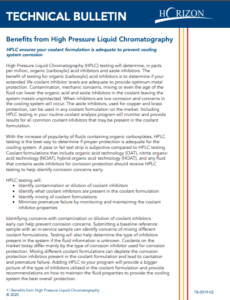Do You Have the Right Coolant Testing?
Providing a Greater Understanding
Do you have an extended life coolant? Did you know that mechanical and/or contamination can occur causing the extended life coolant properties to decrease and reduce the life of the fluid? Have you ever had an unknown coolant formulation in the cooling system and a coolant top off was needed? Including High Pressure Liquid Chromatography (HPLC) testing to your program will provide the additional information to assist with providing a greater understanding of your fluid properties. When HPLC testing is included in your coolant test package, additional coolant inhibitors that may be in the coolant formulation will be monitored. Results for the inhibitors will be reported in parts per million.
What is High Pressure Liquid Chromatography (HPLC) Testing?
HPLC testing will report two different inhibitor types:
- Carboxylic organic acids
- These acids will be utilized in extended life coolant formulations and hybrid formulations. The inhibitors will provide corrosion protection of the metals in the cooling system. The corrosion protection inhibitors needed for your application and formulation must be maintained and adequate to protect your cooling system.
- There are a lot of different organic acids that may be used in the coolant formulation. Understanding the coolant formulation is a key factor in maintaining the coolant appropriately.
- Carboxylic organic acids our method reports:
- Benzoic Acid
- Sebacic Acid
- 2-Ethylhexanoic Acid
- Octanoic Acid
- P-Toluic Acid
- Adipic Acid
- 4-Tert-Butylbenzoic Acid
- Azoles
-
- Azoles may be utilized in any coolant formulation on the market. Azole inhibitors are for copper and brass protection in the coolant formulation.
- Azoles our method reports:
- Benzotriazole (BZT)
- Tolytriazole (TTZ)
- Mercaptobenzothiazole (MBT)
HPLC Compared To Test Strip
HPLC testing will provide more insight of the type of inhibitors in the coolant formulation compared to a pass/fail carboxylic acid test strip. Test strips are subjective as a color determination is usually the indicator for the result. Test strips will only work for certain coolant formulations determined by what the test strip is looking for. Whereas HPLC testing can be performed on any coolant formulation and report each of the organic acids and azoles the method is able to report in ppm. The HPLC testing will indicate concerns of mixing coolant formulations when compared to a baseline. HPLC testing will also help determine if carboxylic organic acids and azoles are utilized in the coolant formulation or not. A test strip will not be able to provide this information and may or may not be applicable for the coolant formulation providing an inaccurate result making more difficult to maintain your fluid appropriately.
Reach out today! Add High Pressure Liquid Chromatography testing to your program.
Including HPLC testing to your program will provide testing to determine if organic acids and azole inhibitors, utilized in some coolant formulations, are being maintained for proper protection.
HPLC testing will provide more insight on how to maintain the coolant formulation and will determine if concerns are present impacting your corrosion protection inhibitors. Catching concerns early and making corrections will lower corrosion concerns and even possible cooling system issues that could have led to engine problems.
Check out our Technical Bulletin to find out more information on how High Pressure Liquid Chromatography (HPLC) Testing works:

Proven Impact. Proven Uptime. Proven Savings.
Let us prove it to you.





